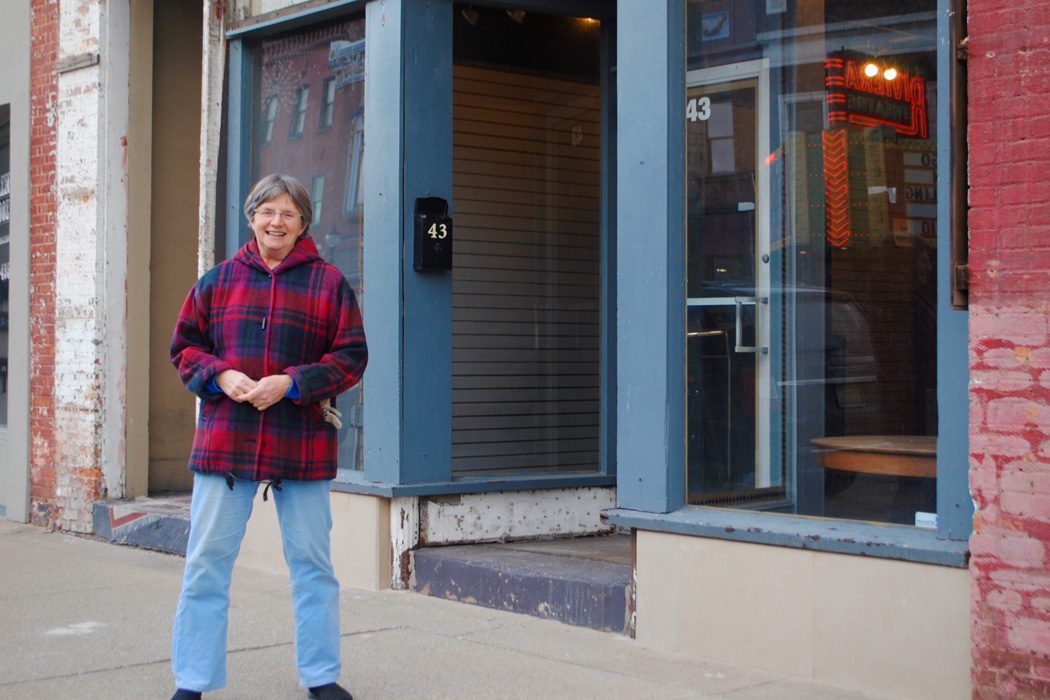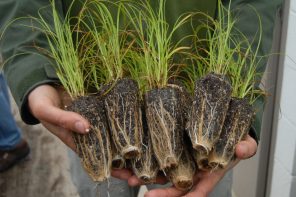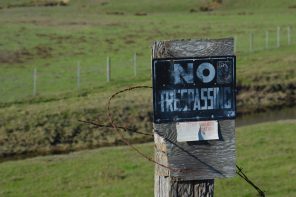Editor’s Note: For the “Local Government” issue of Topology, we interviewed individuals who have been involved in local government in and around Three Rivers, Michigan, where most of the Topology editorial staff live. This week, meet Carol Higgins, pictured outside of the building in downtown Three Rivers used by the St. Joseph County Democratic Party during the 2016 election cycle.
Local government resume
I was a candidate for the State House, District 59 three times—in 2008, 2010, and 2016. I had the largest vote during my first campaign, when Obama happened to be on the ballot for the first time.
Other civic involvement
In 2009, I was appointed as a board member for the St. Joseph County Conservation District. In 2010, I was elected to the position and I have been the chair since 2011. (Conservation Districts are arms of state government.) I am also a member of the county Solid Waste Committee, I think since about 2009 as well. I have been a member of the St. Joseph County Democratic Party since 2008, serving as secretary and membership chair. I believe in working together; I’m a member of two unions, an electric cooperative (I ran unsuccessfully for the board), and I have supported food co-ops and CSA’s (Community Supported Agriculture).
Why did you run for office?
I ran because I believe I can make a difference. I’ve had so many life experiences from which to draw. I ran because I’ve seen too much change in policy in recent years that benefits the wealthy and leaves the rest behind. I ran because I like to discuss issues and solve problems. I ran because I believe it is not healthy in a democracy for candidates to run unopposed–[having a race with options] helps keep those elected on their toes, so to speak. [In 2016] I ran because, early in the year, particularly while Bernie Sanders was a candidate, I felt people wanted change at the state level and I offered that change.
What is one dream you have for your community in the next five years?
I would like to see our area become resilient in food and energy production and improve the health of our water, soil, air, and all living things that dwell here. I would like to see food hubs developed to provide a better way for small farmers to market their crops, along with seed banks that would safely store seed to protect bio-diversity and provide a back-up if markets fail. I would like to see industrial hemp become a viable crop and a growth in corresponding markets. I would like to see emergency plans developed at the township level that address how we cooperate to get through a serious catastrophe. There are many people who are concerned about the threat of terrorist attack on our food supply or the electric grid. Some of the wealthy are even investing millions in condos housed in retired nuclear bunkers where they will live securely if traditional food and energy systems fail. I would like a plan that helps the rest of society through such an event with the least negative impact possible. I would like to see efficient, micro energy grids that will not crash if a neighboring section of the grid goes down. I would like to see jobs in renewable energy available locally.
What is your advice for citizens who wish to influence their local government?
My advice for others who wish to influence local government is to begin by going to meetings and asking questions during public comment. Expect an answer, or a pledge for when to expect an answer. Expect to be given copies of the minutes and the agenda. Ask what your local township/village is doing to promote something that you feel is important–perhaps better recycling options, more office hours, more communications with constituents, or a list of committees that need resident volunteers. Offer to help with elections, apply to become a precinct delegate or a poll watcher. I have discovered how important it is to build a team of support on issues you care about. Bring neighbors along and invite them to comment also on the things you feel need to be addressed. Write letters to the editor, and to your representatives. You will find yourself researching the issues more and you will develop a better understanding of the complexities involved in our democracy.





